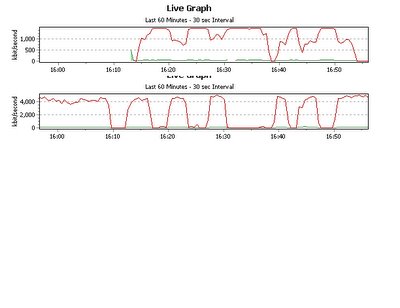When is a priority not a priority ?The "business" service MaxDSL Premium has a higher upload speed and is "given higher priority at times of congestion". Some ISPs, for example Griffin, interpret the product spec as Max Premium giving double the minimum throughput of standard Max. Max Premium is effectively the "up to 20:1 contention" product in the old language.
We have been experiencing poor performance on the Max Premium lines that feed part of the
SWBB Wireless network and for some weeks now had observed that the Premium lines actually performed worse than the Standard lines on the same exchange from the same wholesale ISP (Entanet).
Our observation is that a Max Standard line will not drop its throughput if a Max Premium line comes online with a heavy download, but that the opposite will occur. Two standard lines affect each other to a small extent, but one or two standard lines can have a big impact on a premium line. So premium price gives discount performance and the priorities appear in practice to be reversed.
 The top trace is the throughput of the Premium line. Just before 9am (Sunday test) it downloaded a 10M file when the bottom (standard line) was downloading a 100M file. The main observation here is that the standard line showed no effect whatsoever.
The top trace is the throughput of the Premium line. Just before 9am (Sunday test) it downloaded a 10M file when the bottom (standard line) was downloading a 100M file. The main observation here is that the standard line showed no effect whatsoever.
After 9am the premium line was set off on a series of downloads of a 100M file while the other lines were used periodically. Between 09:00 and 09:10 the bottom line makes a series of three downloads of the 10M file and the impact on the premium line can be seen by the three dips in its speed trace. The "office" line slows down when the "home" user makes a download.
Around 09:15 the two standard lines made a total of 3 downloads of the 10M file and "blipped" the throughput of the premium line.
At 09:20 the middle line started on a download of the 100M file, with the bottom line joining it after a couple of minutes. The combination of two competing downloads proved fatal for the premium line which dropped in speed to below 1000 kbits/s from over 4000. Both standard lines continued at over 2000 kbits/s - well over double the premium line despite having about half the maximum line speed.
When the bottom line finishes just before 09:30 the middle line gains some speed and the premium line also increases, finally restoring its original speed when the middle line is done.
So clearly the priority system is working contrary to expectations, reducing throughput of MaxDSL Premium lines on the same exchange in order to meet the bandwidth demand of MaxDSL standard lines.
[The 100M file source can supply well over 10 Mbits/s as witnessed by pulling 5M from a different exchange on a Standard line without impacitng the above line's throughput. The 10M file is taken from Microsoft.com and the 100M from a UK hosting centre.]




